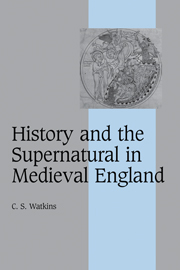Book contents
- Frontmatter
- Contents
- Preface
- Note on the text
- List of abbreviations
- INTRODUCTION
- Chapter 1 THINKING ABOUT THE SUPERNATURAL
- Chapter 2 INVENTING PAGANS
- Chapter 3 PRAYERS, SPELLS AND SAINTS
- Chapter 4 SPECIAL POWERS AND MAGICAL ARTS
- Chapter 5 IMAGINING THE DEAD
- Chapter 6 THINKING WITH THE SUPERNATURAL
- CONCLUSION
- Bibliography
- Index
- Cambridge Studies in Medieval Life and Thought Fourth Series
CONCLUSION
Published online by Cambridge University Press: 23 June 2009
- Frontmatter
- Contents
- Preface
- Note on the text
- List of abbreviations
- INTRODUCTION
- Chapter 1 THINKING ABOUT THE SUPERNATURAL
- Chapter 2 INVENTING PAGANS
- Chapter 3 PRAYERS, SPELLS AND SAINTS
- Chapter 4 SPECIAL POWERS AND MAGICAL ARTS
- Chapter 5 IMAGINING THE DEAD
- Chapter 6 THINKING WITH THE SUPERNATURAL
- CONCLUSION
- Bibliography
- Index
- Cambridge Studies in Medieval Life and Thought Fourth Series
Summary
The twelfth century witnessed the transformation of historical writing as new genres emerged and old ones evolved under the influence of new theological and philosophical approaches to explanation. The histories written by monks in the earlier twelfth century, of which Orderic's monumental work stands as an example, tended to be morality-infused: the cosmos and human experience were textured by the working of divine will such that history and nature functioned as illuminations of scripture. And yet we need to remember that the description of the past conceived by Orderic was to some extent a didactic account of human experience. It taught that men and women inhabited a moral universe and that history was divinely ordered and wonder-rich. This argument had to be made against a contrary view, formed by experience, which said that wonders were rare and lacked the pattern and purpose that Orderic ascribed to them. We can detect this alternative even in Orderic's own accumulation of extra evidence for wondrous things. This seemed to anticipate the objection of some in his audience that no one had seen such marvels. A similar scepticism is present in William of Malmesbury's story of the fall of the tower over Rufus's grave, where the author manoeuvred to escape mockery for credulously assuming that the collapse was a sign.
- Type
- Chapter
- Information
- History and the Supernatural in Medieval England , pp. 226 - 234Publisher: Cambridge University PressPrint publication year: 2007



